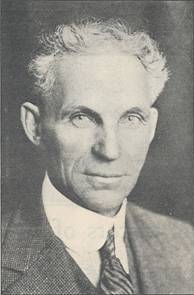|
|
by Rick Baker
On Mar 24, 2011
When I say, “Entrepreneurs must be able to lead change” I am talking about ‘people change’.
You must be able to lead ‘people change’.
Start with yourself….understand yourself:
- Know your strengths
- Know your weaknesses
- Learn how your brain operates
- Know how your logical mind and your emotions interplay
- Know how different situations will influence your reactions
Only when you understand yourself will you have a fighting chance to understand other people.
Do not be lazy about it.
Do not let your mind trick you.
Do not presume you fully understand yourself, even worse, that you understand other people.
These skills require long-term effort.
There is a metaphor to explain what I am trying to convey here.
In that book he describes people’s minds as Riders, on Elephants, walking on Paths.
Riders, Elephants, & Paths.
The Rider is the logical part of our mind.
The Elephant is our emotional part.
And the Path is the situation.
When logic and emotions disagree…emotions win.
Our emotions [the Elephant] ignore our logic [the Rider] and act or react to the situation at hand [the Path].
We must understand this interplay between logic, emotions, and situations if we are to make Changes For The Better.
by Rick Baker
On Mar 8, 2011
For a while now I have wanted to write a paper about workplace stress.
I decided, rather than wait to complete it I would write out some preliminary thoughts…this Thought Post is an introduction.
First, here’s an excerpt from Wikipedia:
Signs of stress may be cognitive, emotional, physical or behavioral. Signs include poor judgment, a general negative outlook[citation needed], excessive worrying, moodiness, irritability, agitation, inability to relax, feeling lonely, isolated or depressed, aches and pains, diarrhea or constipation, nausea, dizziness, chest pain, rapid heartbeat, eating too much or not enough, sleeping too much or not enough, social withdrawal, procrastination or neglect of responsibilities, increased alcohol, nicotine or drug consumption, and nervous habits such as pacing about, nail-biting and neck pains.”
Next, here’s some information provided in David J. Lieberman books:
What causes stress and how do people react to it?
Stress happens:
- When we have doubts
- When we are not Confident
- When we do not feel in control of the situation
5 different kinds of stress:
- Acute & short-lived
- Example – many people are stressed when they must give a speech
- Acute with a sequence of challenge of some duration
- Example – the 911 tragedy
- Chronic demands, pervasive and personal
- Example – taking care of an ailing relative
- Lingering
- Background stressors
- Examples – traffic, loud music
People react to stress 3 ways:
- Avoidance
- Problem-focused coping, when the stressor/situation can be changed
- Emotion-focused coping...change the way we feel
…to be continued
by Rick Baker
On Mar 3, 2011
Did Henry Ford fire people for smiling during working hours?
Did Henry Ford believe the workplace was for work and everything personal should be left at home before we head off to work?
Did Henry Ford believe casual chats and humour had no place in the workplace?
Whether fact or legend, perhaps the answer is not important.
But, the topic of humour in the workplace is important.
I agree with U.S. President Dwight D. Eisenhower, who said:
“A sense of humor is part of the art of leadership, of getting along with people, of getting things done”
Whether you agree or not, you may want to consider the following sorts or questions:
- Does workplace humour promote creativity or innovation?
- Does workplace humour promote harmony amongst co-workers?
- Does workplace humour reduce people’s stress levels?
- If workplace humour is a good thing…what type of humour is acceptable?
- If workplace humour is a good thing…how much is the right amount?
- If workplace humour is a good thing…how should we bring it about?
 |
Henry Ford
Apparently, as he grew older Henry Ford relaxed his approach to discipline.
← an interesting expression…
|
 |
|
Mona Lisa →
|
“Coming together is a beginning; keeping together is progress; working together is success.”
Henry Ford
“Don't find fault, find a remedy.”
Henry Ford
by Rick Baker
On Jan 27, 2011
I know people who retired with a nest egg, had major investment losses, and are now back to the old grind of work.
Backing in to another career or job…that, of course, is something we would like to avoid.
***
The other day a friend and I shared stories and thoughts about investor habits.
We talked about many things: the charm of income trusts, the appetite for dividends, pension fund challenges, that reluctance to exit lost-cause stocks, a range of private investments, and the enticing advice provided by next-door-neighbours.
We talked about retired folks who lost a huge part of their net worth when the markets crashed in 2008…very sad stories, in some cases life-changing stories.
All of this raised a few thoughts:
- Emotions, not logic, play a major role when people make decisions.
- Let’s think about the irrationality factor, a component of human nature…how does that fit in and what, if anything, can be done about it?
- Let’s think about knowledge over-confidence, another component of human nature…again, how does that fit in and what, if anything, can be done about it?
Considering this in terms of Good Habits, Bad Habits, & New Things…
Perhaps people will do better at investments if they carve their current investment activity into 2 pieces:
- Investments that pass a Good Habits test
- Investments that do not pass a Good Habits test…and must be classed as investments that are Bad Habits
The first step would be writing out a list of criteria that when combined will become the Good Habits test for investments.
The next step would be sorting through existing investments to determine the investments that will be retained because they pass the Good Habits test.
The next step would be replacing all the other investments with new investments that pass the Good Habits test.
Of course, this requires some self-discipline and some work.
And, the work should be done when:
- emotions are under control,
- knowledge over-confidence is in check, and
- we are 100% comfortable receiving 3rd party advice.
by Rick Baker
On Jan 24, 2011
Sales Tweet #136 Fear is the darkroom where negatives are developed.
The Thinking Behind the Sales Tweet
I read that somewhere, many years ago. An interesting mind-picture. An accurate metaphor. Avoid the darkrooms and the dark spots…seek brilliance and concentrate on the Bright Lights.
by Rick Baker
On Jan 5, 2011
Here is a table I created after reading Stephen R. Covey’s The 8th Habit.
The 8th HABIT - Stephen Covey
|
WHOLE PERSON
|
4 NEEDS
|
4 INTELLEGENCES / CAPACITIES
|
4 ATTRIBUTES
|
VOICE
|
VALUES / MANIFESTATIONS
|
|
MIND
|
To learn
|
Mental Intelligence (IQ)
|
Vision
|
Talent (Disciplined Focus)
|
desire, dreams, hopes, goals, plans, imagination... sense of self, destiny, mission, role in life, purpose and meaning
|
|
BODY
|
To live
|
Physical Intelligence (PQ)
|
Discipline
|
Need ("See" Meeting Needs)
|
define and accept reality, subordinating today's pleasure for a greater longer-term good
|
|
HEART
|
To Love
|
Emotional Intelligence (EQ)
|
Passion
|
Passion (Love To Do)
|
optimism, excitement, emotional connections, determination
|
|
SPIRIT
|
To Leave a Legacy
|
Spiritual Intelligence (SQ)
|
Conscience
|
Conscience (Do What's Right)
|
fairness, honesty, respect, contribution
|
|
|